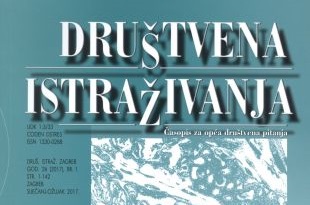TRADICIONALNA I NOVA RELIGIOZNOST U POSTKOMUNIZMU: PROMJENE U RELIGIOZNOSTI STUDENATA 1990.-1994.
TRADITIONAL AND NEW RELIGIOSITY IN POSTCOMMUNISM: THE CHANGES IN STUDENT RELIGIOSITY 1990·1994
Author(s): Jasminka LažnjakSubject(s): Evaluation research, Sociology of Culture, Transformation Period (1990 - 2010), Post-Communist Transformation, Sociology of Education, Sociology of Religion
Published by: Institut društvenih znanosti Ivo Pilar
Keywords: Traditional; New religiosity; Post-communism; 1990-1994;
Summary/Abstract: The recent researches in Central and Eastern Europe show increasing religiosity. The purpose of this research was to investigate religious changes that have occurred in Croatia in the past few years. The survey was performed on a sample of the student population of Zagreb University in 1990 and 1994: 1. to determine the existence of multidimensional religiosity analyzing the possible secularization influence of university education (only in 1990); 2. to investigate the influence of radical change of the social system on religiosity questioning the same generation of students at the beginning (1990) and at the end (1994) of their studies. Factor analyses provided in both researches four types of religiosity, although not identical ones. Both times, the first two as well as the most important factors were Christian faith and atheism, while the other two in 1990 were the denial of the meaning of life and death, and empty belief. In 1994 the other two were: not recognizing the meaning of life and death and its denial.
Journal: Društvena istraživanja - Časopis za opća društvena pitanja
- Issue Year: 6/1997
- Issue No: 27
- Page Range: 49-70
- Page Count: 22
- Language: Croatian

